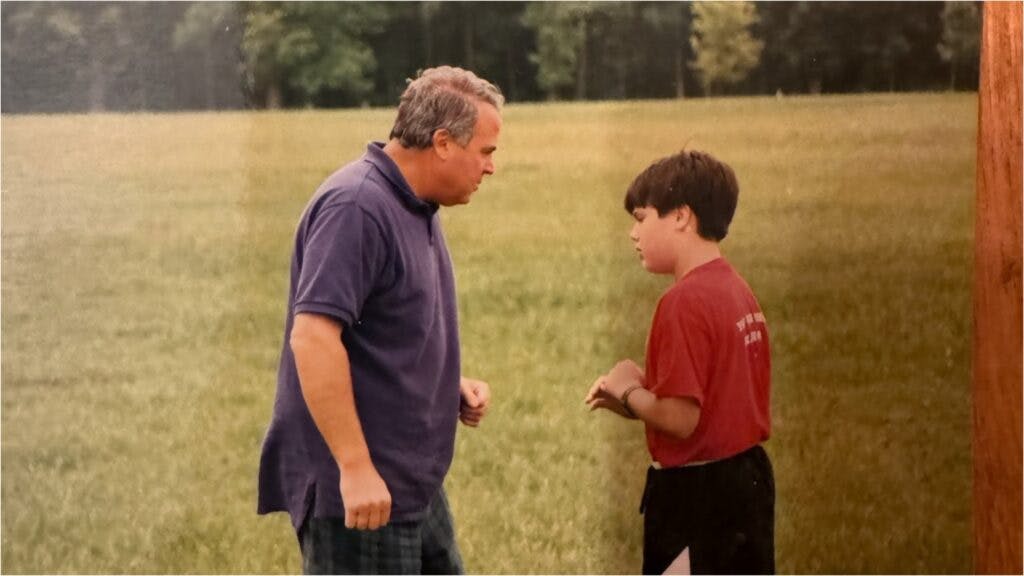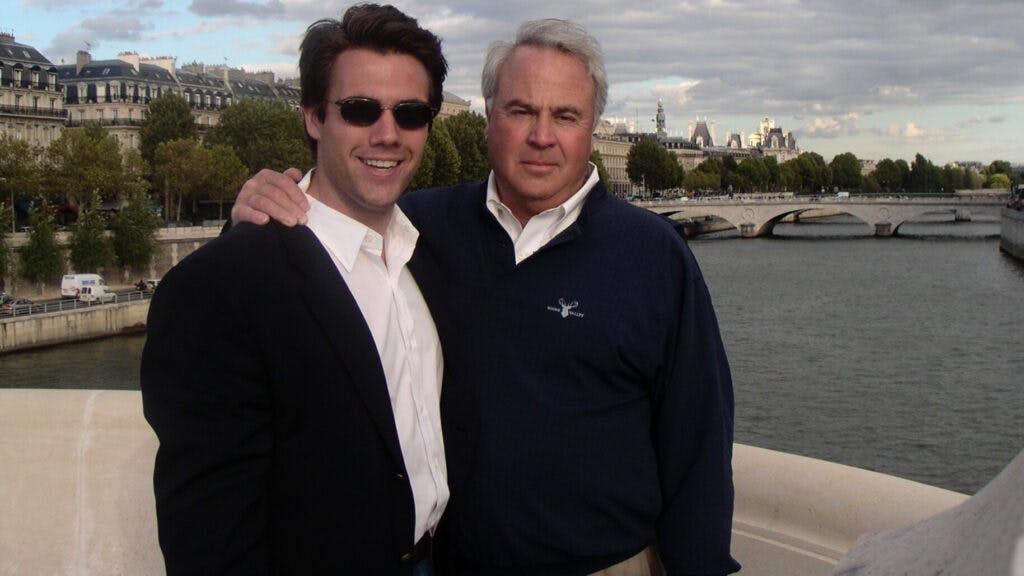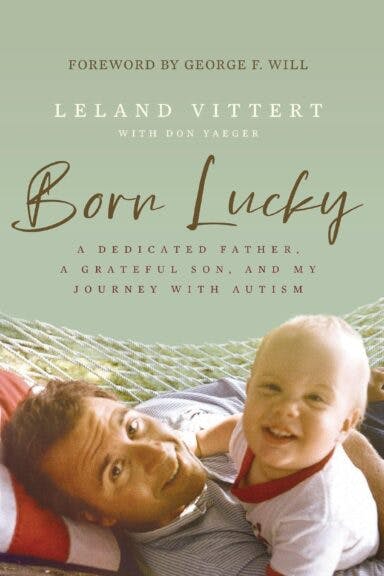You may recognize Leland Vittert from his work as an anchor on NewsNation. What you may not recognize, however, is that Leland got to where he is after being diagnosed with autism.
With renewed scrutiny on the causes of autism, his new book “Born Lucky” is flying off the shelves, landing at #4 on the New York Times bestseller list. It’s not just a story about how Leland managed to build a successful life with autism, but also about the people who sacrificed to make that possible.
So when we asked about publishing an excerpt from it, Leland suggested the afterword, written by his dad. After reading it, we understand why. But we asked him to explain it to our readers as well.
We hope you enjoy. — The Editors
* * *
When I was diagnosed with what we now know to be autism, my father quit his job and became a full time parent, coach, and friend. It was, as he describes it, my only hope. He felt hopeless and helpless and with good reason. The psychologist who tested me told him there was “generally not” anything parents could do for kids in my situation and it was “difficult to understand” what’s going on in my head.
My father’s mission to adapt me to the world, rather than the world to me, took him 15 years – to be fair, I am now 43 and he is still working on it.
In my new book, “Born Lucky: A Dedicated Father, Grateful Son, and My Journey with Autism,” I tell the story of my father’s journey and how he never told anyone of my diagnosis: not teachers, not therapists, not his friends, and not even me!

Credit: Leland Vittert
Thanks to my dad (and mom) things have worked out pretty well. We endured the hell that was middle school, where principals told my parents I was “weird” and teachers compared me disfavorably to their dog’s asses. I am now married to a magnificent woman and I’m a national cable television anchor. What dad didn’t know at the time was that the hell of middle school would be great training for a Washington newsroom.
Dad says he isn’t a hero. I would argue that point, but he can describe himself however he wants.
At first, he didn’t want to tell this story because the book would contain my darkest moments. So, we made a deal: I would write the manuscript and at the end, if he didn’t like it, we wouldn’t turn it in to HarperCollins. To be honest, I had no plan if he said he did not like it.
But at that moment of decision, I asked him a question: If, when I was originally diagnosed, the psychologist had given him our book “Born Lucky’ (rather than saying there was not much to do), how would he have felt?
He responded that he would have read it every week because it would give him hope.
The book is hope for every parent with a kid who is struggling, not just with autism but anxiety, ADHD, difficulty at school, etc., and proof of what a father and mother’s love can do.
That’s why I asked my dad to write the afterword in the book in the form of thoughts for parents facing some of the same challenges he did.
I would like to share that with you now.
— Leland Vittert
* * *
The following excerpt is taken from the Afterword from the book “Born Lucky: A Dedicated Father, A Grateful Son, and My Journey with Autism,” by Leland Vittert with Don Yaeger. (Harper Horizon, September 2025).
* * *
Afterword From Dad
As you have already read, Lucky, decades ago, placed me on a pedestal.
This occurred simply as a result of his fundamental needs, that there was no one else, no other man, to help him and hold him. Consequently, it might appear in this book that I offered him support as a secure and knowledgeable father. That was not true.
I was scared for years. I still am to a degree, uncertain quite often and holding on for my family till sleep comes, bringing a few hours of peace.
For all of us who are in the most difficult and complex battle to help our special children survive, there is no finish line.
I am positive that every father and mother engaged in the monumental effort to help and protect and love our challenged children are dealing with the same issues.
Believe me, despite Lucky’s admiration, I did only what any father would want to do.
All of us in this battle, this fight against what feels like the world has left our side, are in the same place.
We all feel enormous love and responsibility to those little ones who are absolutely lost and, without us, alone. Mothers and fathers need to know that there is definitely hope.
I am not that smart nor capable to have known what to do for him, except to love him and listen always to his cries for help, and to enlist a couple of personal rules that seemed to make sense in a frightening circumstance.
Let me say that his mother, Carol, was the unsung angel here. She not only had to hold Lucky, but also me.

Credit: Leland Vittert
I really did not know what was ahead, who could help, or if the verdict was just “give up.” Well, the purpose of this book is to offer hope, real hope. Here are the principles that I wrote down for myself when Lucky was diagnosed:
- Have no expectations about the future.
- Under no circumstances let your child feel that they have ever disappointed you. EVER, under no circumstance.
- You are the depository of their hurt, their frustration, and their humiliations. You must listen and listen—morning before school and late into the night.
- Tell them that they have the right stuff for life. That the currency of high school, etc., is not the currency of life. There are many more years after the six years of junior high and high school.
There were times where I reflexively responded to a seemingly endless difficult day with temper. Those were the most regrettable of times.
I fully understand that so many had and will have far more significant challenges and difficulties than we had.
You will need to remember that your child will continue, no matter the advancement, to simply be themself. This is not a broken arm that heals; it is the way they were made.
Together, whatever the circumstance or how dire the situation, there is hope, good hope, but it will require endless understanding and the firm belief that your child can be better.
With the advent of so much bullying and other negative effects from today’s social media culture, it will be hard to escape. We did not have to address that issue.
We did not discuss Lucky’s issues or labels with anyone, nor did we seek outside assistance. Perhaps that would have been better. I do not know.
Whatever your child’s issue, I believe their best chance to progress is you and your love and patience and, in particular, your unwavering belief in them.
It was felt that writing this book could possibly help. There are so many of us who were and are lost in the nightmare of this despair.
If you are in this fight, it will be a challenge that is the most worthwhile of your life. It will probably take years and years, but it will be worth it.
If someone would have told me about what the future held for our little boy, I would have likely yielded right then. I would have been terribly wrong to do so.
If I can do it, you can. You can make an enormous difference for the ones you love dearly.
With all my heart, I wish for you and your child a future that you will make better together.
— Mark Vittert
* * *
This excerpt is published by permission from Harper Horizon. “Born Lucky: A Dedicated Father, A Grateful Son, and My Journey with Autism,” by Leland Vittert with Don Yaeger. (Harper Horizon, September 2025).
The views expressed in this piece are those of the author and do not necessarily represent those of The Daily Wire.
Get 40% off new DailyWire+ annual memberships with code FALL40 at checkout!

Continue reading this exclusive article and join the conversation, plus watch free videos on DW+
Already a member?


.png)
.png)

